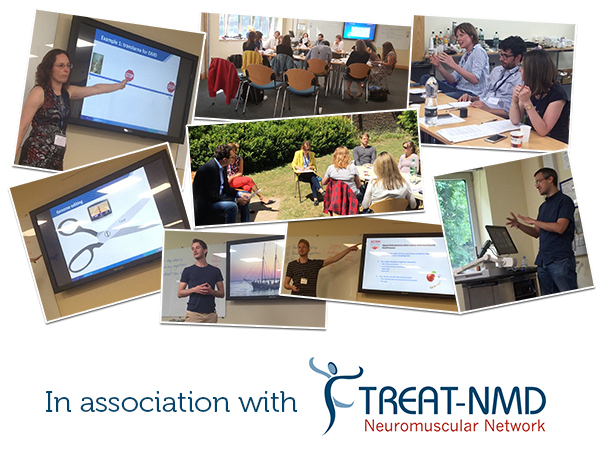Our annual Summer School is fast becoming an established feature in the community’s calendar.
The courses, which are delivered by key experts in the field, are kept deliberately small to ensure a high quality, truly immersive experience for all attendees.
If you are interested in acquiring a well-rounded understanding of the translational research pathway and boosting the development of your future career we recommend subscribing to our newsletter and/or following us on Twitter @EURO_NMD to keep updated with programme developments and application dates.
Below you will find information about the last two schools to provide an idea of what can be expected.
Sadly, we were unable to hold a 2020 Summer School due to the COVID-19 pandemic.
The Neuromuscular Translational School organized by EURO-NMD and TREAT-NMD focuses on therapy development from bench to bedside with a focus on neuromuscular disorders. The Translational Summer School contains lectures about the current state of the art of the management of acquired and genetic neuromuscular diseases, the different steps of drug development and the tools needed for this (outcome measures, biomarkers etc). It also stresses how patients should play a role in each of these steps and teaches how to communicate research to patients and the general public during interactive workshop sessions.
The Translational School took place in autumn from November 21-25, 2022 in Leiden University Medical Center, the Netherlands.
The 4th NEUROMUSCULAR TRANSLATIONAL SCHOOL has been accredited by the European Accreditation Council for Continuing Medical Education (EACCME®) with 25 European CME credits (ECMEC®s). Each medical specialist should claim only those hours of credit that he/she actually spent in the educational activity.

Download our past 2022 summer school programme at a glance
We are in the process of developing our programme for the next neuromuscular translational summer school which will be held on 10-14 July 2023
This five-day summer school has been developed for researchers and clinicians interested in translational research.
3rd Neuromuscular Translational Summer School
Under auspices of EURO-NMD and TREAT-NMD
6-10 DECEMBER 2021
Leiden University Medical Center, the Netherlands
Target audience:
– MDs
– PhD/Postdoc researchers
– Others working in translational research
– Preferably in the NMD field, but in either case working in the RD field
– Aim for 16 participants (definitely no more than 20 – or we lose the interactiveness)
– We could also target one or two industry employees (with a specific fee).
Aim:
– Facilitate the clinical development of therapies for NMDs
Objectives:
– Educate clinicians and researchers working in the NMD field on aspects relevant for translational therapy development:
o Bench to bedside research
o Regulatory system
o Clinical trials
o Outcome measures
o Patient communication
o Registries and biobanks
o Biomarkers and -omics
– Outline and showcase how networks like EURO-NMD and TREAT-NMD facilitate therapy
development
o Standards of care
o Clinical trial tools
o Outcome measure development
o Interaction with stakeholders

Download our past 2021 summer school programme at a glance
We are in the process of developing our programme for the next neuromuscular translational school which will be held on 21-26 November 2022
This five-day summer school has been developed for researchers and clinicians interested in translational research.
The second Neuromuscular Translational Summer School built on the success of the first, and took place in Leiden, The Netherlands on 1st – 5th July 2019.
The five-day course which was organised and delivered in association with TREAT-NMD included an overview of the following:
- Neuromuscular diseases and current care and management practices.
- Bench to bedside research.
- Challenges for rare disease therapy development and networking solutions.
- Tools of the trade for preclinical research. · An introduction to TACT (TREAT-NMD Advisory Committee for Therapeutics) and a TACT mock review session.
- Introduction to clinical trials.
- How the regulatory system works.
- The Industry perspective on drug development for rare diseases.
- Outcome measures used in clinical trials.
- TREAT-NMD tools for clinical trials.
- Biomarkers.
- PROM development.
- Post-marketing.
- Patient engagement.

Download our 2019 summer school programme at a glance.
We are in the process of developing our programme for the next summer school which will be held in 2020. Further information will be available in due course please regularly visit the website or monitor our twitter feed to ensure you keep up to date.
Our first ever summer school was a course was especially developed for researchers and clinicians interested in translational research.
This course addressed the following aspects as it travels along this established pathway.
- Bench to bedside research
- Regulatory system
- Clinical trials
- Outcome measures
- Patient communication
- Registries and biobanks
- Biomarkers and –omics

Download our past 2018 summer school programme at a glance
Participants for our very first summer school were based at Newcastle University in the UK for the week-long school.
During their stay, they discovered how networks such as the European Reference Network EURO-NMD and TREAT-NMD work and collaborate with patients and regulators to facilitate therapy development. Aspects such as standards of care, outcome measure development, biomarkers and others were discussed and debated during the week. Attendees also found out about the various interactions that take place between key stakeholders.
Attendees discovered how the regulatory system works and also took part in a TACT style review and indepth discussion on ethical issues in clinical trials.
In addition, attendees found out about various outcome measures and gained an appreciation of the need for standardisation and training in this area. They participated in a clinical trial practicality forum as well as a patient communication workshop which focussed on patient communication which was developed especially for our school by Dutch behavioural scientists.
Attendees who completed this course now possess the knowledge of the many different aspects that are involved in translational research and also have a deeper understanding and compassion for those involved in the whole trial process from researcher to patient.



